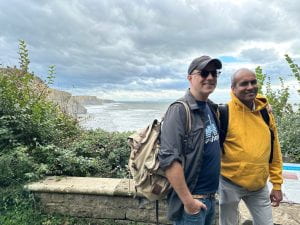M. V. Ramana is a Professor at the University of British Columbia in Vancouver, Canada, and has been engaged in research about nuclear energy for over two decades. He visited the University of Bristol in September 2023 as a Bristol ‘Next Generation’ Visiting Researcher to consolidate work that advances a range of new perspectives on the safety of atomic energy.
Thanks to support from the Bristol ‘Next Generation’ Visiting Researcher Programme and my host Dr. John Downer (School of Sociology, Politics and International Studies), I visited the University of Bristol and the city of Bristol for the first time in September 2023. The main purpose of the visit was to build on our earlier collaboration, which examined safety assessments of nuclear reactors and the nature of knowledge claims about the likelihood of severe accidents. This work was based on a case study of the processes through which the U.S. Nuclear Regulatory Commission licensed the “AP1000 reactor” design. This project brought together our separate backgrounds and resulted in a paper published in the journal Regulation & Governance.
During my visit, John and I spent hours discussing the contours of a collaborative monograph on the safety of nuclear reactors, and started developing a proposal to be sent to publishers. Although we had been going back and forth over email about how to structure such a monograph, our discussions, which took place over a wide variety of settings—from the School office to coffee shops to walks in Wales over a weekend day trip—really helped us move forward.
 Image: John Downer and M. V. Ramana in Southerndown, Wales
Image: John Downer and M. V. Ramana in Southerndown, Wales
I also gave a couple of lectures. One was titled “Small Modular Reactors And Other Nuclear Fantasies”, and it built on many papers of mine on the topic of small modular reactors, in particular ones published in Energy Research and Social Science, Science, Technology and Human Values, and in IEEE Access. In my talk, I described how nuclear energy’s declining share of global electricity generation is due to the high costs of building nuclear reactors, and how the nuclear industry hopes to deal with the economic challenges and other problems associated with nuclear power by building what are called Small Modular Reactors (SMRs). I then described some of the claimed attributes of SMRs, and explained why these are not realistic expectations. Finally, the talk discussed the broader set of fantasies that are motivating some to support nuclear energy in the face of its lack of economic competitiveness and the obvious risks associated with the technology.
The second lecture was titled “Separating The Inseparable: Civilian Nuclear Energy’s Connections To The Bomb” and it built on my papers published in Nuclear Technology and Science and Global Security, as well as my book The Power of Promise on nuclear energy in India and a forthcoming book on the political economy of nuclear energy to be published by Verso books. In my talk, I traced the history of nuclear power to the beginning of the atomic age, when most knowledgeable people recognized that civilian nuclear programs could be used to produce nuclear weapons. I explained how that changed within a few years, when countries with nuclear technology started a sustained campaign to get the public to think differently about nuclear energy, most notably after President Dwight Eisenhower’s Atoms for Peace speech in 1953. I then explained why there are deep connections between the two pursuits, in particular the technical overlaps between the processes used to generate nuclear energy and make material for nuclear weapons, interchangeability of personnel, and institutional imperatives. Thus, I concluded, expanding nuclear energy will necessarily increase the risk of nuclear war.
The lectures were well attended and the questions were interesting and challenging, with the discussion becoming heated on occasion. The presence of a number of young students was gratifying, as was the fact that one of them who attended both my talks went on to post about these on LinkedIn. I also enjoyed meeting many of John’s colleagues and students, in particular Tim Edmunds and Sveta Milyaeva.
I am grateful to John and the International Research Development Team for making this trip possible.
